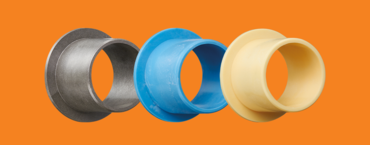
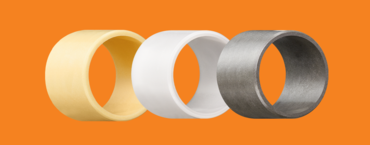
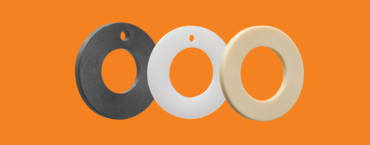
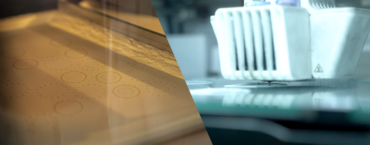
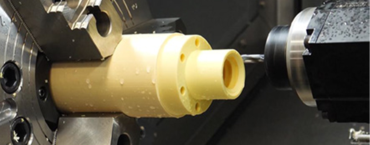
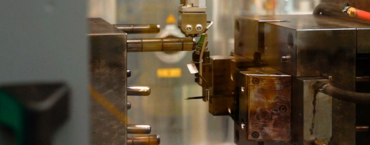
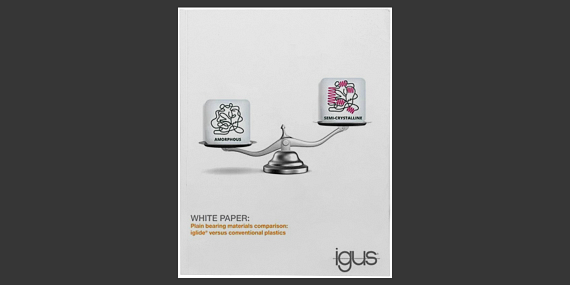
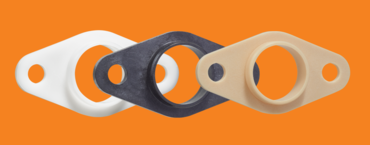
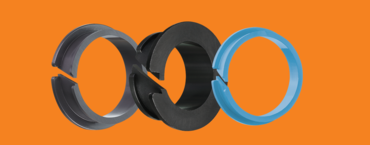
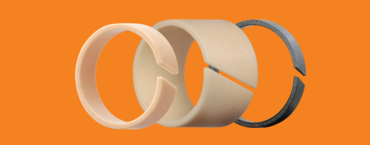
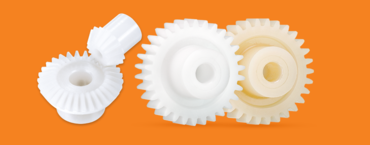
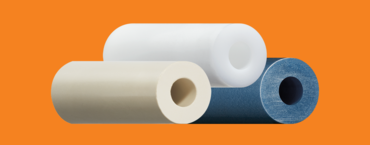
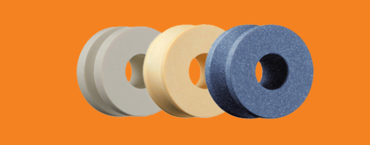
Whether you're interested in end-to-end, fully assembled solutions or looking to build your own customizable project, let us assist you with a solution based on your specific application and requirements. Contact us via the form below or call us at (800) 521-2747 to discuss your project today!
A: The iglide plain bearings are designed to be oversized in the free state (prior to installation) so they can be pressed into a housing (with an H7 tolerance) and then secured by a press-fit. This is achieved by the "press-in excess", i.e. the outside diameter of the bearing is, depending on the nominal outer diameter size, about 0.1 to 0.25 mm larger than the housing in the non-pressed state. The inner diameter reaches its final dimenions and tolerances only when pressed in. Learn more about how to install an iglide bearing here.
A: The variety of iglide materials have been developed to meet a variety of customer requirements over the past nearly three decades. Most applications can be technically covered by the five standard materials - iglide® G300 (G), J, T500 (X), L280 (W300), and M250. But if there is a special or more sophisticated application, or concerns the last price/performance optimization for high volume production, the other iglide materials can be explored.
With all these materials, finding the right one may seem like a daunting task. However, with a few questions about the application, we can run our iglide material selector and determine which material is best suited for your application. Learn more about our main 5 iglide materials here.
A: The special construction of iglide materials comprised of base polymers, reinforcing fibers, and solid lubricants provide excellent wear and friction properties. The solid lubricants help to optimize the existing wear and friction properties of the base polymer, while the reinforcing fibers provide extra strength to the iglide material. During the operation, solid lubricant particles work their way into the shaft material, providing a better running surface. Any additional lubrication with grease or oil is neither necessary nor practical. Watch this video to learn more!
A: In standard cases, we have very good experiences with superglues (e.g. Loctite 401). For materials like iglide® J that are difficult to bond, significantly better results are achieved with 2-component systems (e.g. Loctite 406 + Primer 770). For applications with higher temperatures, we have good experiences with epoxy resin systems (e.g. Hysol).
Additionally, for every bonding connection it is essential that the workpieces are cleaned thoroughly and are free of grease. This can be done with professional detergents, but also with simple fast-acting degreasers. Roughening the contact surfaces also enhances the adhesive effect. Bonding can generally only be a supporting measure and doesn't fully substitute the press-fit. Learn more about it in our blog.
A: Plastic is more environmentally friendly than you’d think - more so than metal, in fact. There are five reasons why polymer plain bearings are considered to be environmentally friendly: the lack of external lubrication, their lightweight nature, high chemical resistance, the minimized energy required to produce a polymer bearing, and the CO2 emissions.
Plastic bushings do not require lubrication, which keeps the environment cleaner. Unlike metal or bronze bearings that require messy lubrication, every iglide plastic bushing uses solid lubricants embedded inside millions of tiny chambers that cannot be pressed out. This means the bushings do not require any oil or grease and so no contaminants are released into the environment. Plastic bushings are also extremely lightweight, which helps reduce fuel consumption and carbon dioxide output. The reduced weight leads to lower masses and subsequently lower energy consumption.
Learn more about the sustainability of our polymer bearings here.
A: Reducing costs is crucial for all businesses, and the choice of bearings determines the feasibility of using low-cost shaft materials. Plastic bushings provide more options as they can work with various shafts. iglide® plain bearings offer a wide range of materials, allowing the combination of the most suitable bearing material with the lowest-priced shaft for the application's required service life. Selecting expensive shafts and bearings that outlast the machine is unnecessary. Considerations include avoiding extremely rough shafts, which can cause wear and particle separation, and preventing excessively smooth shafts that lead to increased friction and stick-slip issues. Self-lubricating bearings are more durable in dirty environments, enabling the use of less expensive shafts, while different shaft materials react differently to bearing wear, with hard-chromed shafts showing less wear with iglide® plastic plain bearings.
Learn more about important characteristics of shaft hardness here.
A: A pin gauge test is the quality check with the highest possible accuracy, because the pin gauge acts like a shaft in a real application and reproduces the narrowest diameter of the bearing. It is usually this aspect that is decisive for the application. Pin gauge inspections are particularly suitable for plastic bearings, as the irrelevant "unevenness" of the bearing due to injection molding is not taken into account. An ideal gliding surface develops later in operation, during the run-in period, when the unevenness of the bearing and the shaft smoothen.
Among other things, igus® ensures through a pin gauge inspection, also called "go/no go test", that our bearings comply with the specifications and work properly after installation. Learn about how pin gauge measuring works here.
A: Some engineers hesitate to use plastic bearings in their designs. Maybe they have trusted metal and bronze bearings for years or they simply don't think plastics can handle the tough applications or environments. Plastic bearings, however, can endure extreme temperatures, heavy loads and high speeds. However, it's important to understand both the advantages and disadvantages of the options available.
Self-lubricating polymer bearings contain solid lubricants which are embedded in the homogenous material. In operation these solid lubricants reduce the coefficient of friction. They cannot be washed off like grease or oil and due to the homogenous structure they are distributed over the entire wall thickness of the bearing. Unlike in a layered structure, the entire wall thickness of the bearing is available as a wear surface with almost identical glide properties.
You can learn more about this topic here.
A: In the course of years, the igus® material developers have developed hundreds of material compounds, out of which almost 60 have been entered in the polymer plain bearing catalog. In principle, the setup is mostly the same:
1. Basic polymers which predetermine the basic tribological, mechanical, thermic, and chemical properties of the bearing
2. Fibers and filling materials which provide the bearings with a high mechanical load capacity
3. Solid lubricants that significantly optimize wear and friction
igus® is continually developing new polymer blends for every application scenario and conducts more than 10,000 tests in its laboratory every year. Unlike most other bearings manufacturers, igus® focuses exclusively on high-performance plastics and is able to economically process them into plain bearings through injection molding. In addition, igus® compiles its test results into a comprehensive database. After each polymer blend is tested, the results are added into the data pool for a unique lifetime calculation program, which allows you to enter your application’s maximum loads, speeds, temperatures, and shaft and housing materials in order to calculate the best plastic bearing and its expected lifetime.
A: Bearing wear means removal of material on the gliding surface, which usually means at the inner diameter of bearing. As iglide® plain bearings have no layered structure and the entire wall thickness is available as a wear surface, the bearing has no theoretical wear limit. Instead, the wear limit is determined by the permitted maximum clearance in an application.
Factors that influence bearing wear include shaft selection, load, speed & type of movement, temperature, dirt/debris, and contact with chemicals. Different shafting materials are recommended for different types of plain bearings. With increasing radial loads and/or surface pressures, the wear of the plain bearings also rises. With increasing speed, the wear also increases. The type of movement has considerable influence on the rate of wear as well.
Depending on the material selection, when the maximum application temperature is exceeded, the bearing’s wear can increase significantly. There are also exceptions, which only reach their minimum wear at higher temperatures. Dirt and dust can accumulate between shaft and bearing, also causing wear. Self-lubricating plastic bushings offer an advantage in this situation: they operate grease-free, so dirt and dust will not clog the shaft or damage the bearing. Polymer plain bearings are also corrosion-free and resistant against a wide range of chemicals, but certain chemicals can change the structural properties of a plain bearing, which decreases the bearing's hardness and increases the wear.
A: The stick-slip effect refers to the intermittent gliding characteristics when two solid bodies slide against each other. The phenomenon occurs when one body is moved whose static friction is significantly greater than the dynamic friction.
Imagine pushing a heavy cardboard box across a smooth floor. The cardboard box is heavy, which is why we need to apply great force to overcome the static friction - the resistance of the cardboard box against being moved. Due to the smooth surface and the resulting low dynamic friction, the box quickly accelerates. Because of the rapid gliding motion of the cardboard box, we are only able to transfer a small force to the cardboard box. Ultimately, the force applied on the carton is insufficient to overcome its static friction. The cardboard box comes to rest, which is why we need to again apply great force to overcome the static friction, and the process repeats.
However, this effect is undesirable on tribologically optimized materials. The resulting vibrations are transferred to the overall structure and cause noise that is frequently perceived as squeaking or chatter. These effects can be counteracted by minimizing the difference between the static and dynamic friction, by employing vibration-damping materials, and by improving the stiffness of the overall structure (pre-tensioned bearings), or by separating the involved friction partners (e.g. with lubricant).
A: EC Directive 2002/95/EC ("RoHS 1") was replaced by EC Directive 2011/65/RU ("RoHS 2") on 3 January 2013.
The directive governs the restrictions on undesired ingredients in electrical and electronic equipment sold within the EC. The RoHS abbreviation means "Restriction of (the use of certain) Hazardous Substances". Specific threshold values were established since there are technical limitations in many materials and products that do not permit a complete elimination.
The affected substances are frequently used in electronics and include lead, mercury, cadmium, hexavalent chrome, polybrominated biphenyls (PBB) and diphenyl ether (PBDE). Application examples include the use of lead in solder, or as an ingredient in metallic composite bearings, and the use of PBB as a flame retardant. The substances also frequently occur in metallic alloys.
As a look at the substances and these usage examples shows, these substances are irrelevant to thermoplastic polymer compounds such as our iglide® materials. The substances contained within our iglide® materials therefore fulfill the requirements of Directive 2011/65/EU (RoHS 2). We will gladly send you confirmations on request.
Click here to find our RoHS 2 certifications.